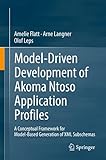Model-Driven Development of Akoma Ntoso Application Profiles [electronic resource] : A Conceptual Framework for Model-Based Generation of XML Subschemas /
Material type: TextPublisher: Cham : Springer International Publishing : Imprint: Springer, 2022Edition: 1st ed. 2022Description: XV, 47 p. 1 illus. online resourceContent type:
TextPublisher: Cham : Springer International Publishing : Imprint: Springer, 2022Edition: 1st ed. 2022Description: XV, 47 p. 1 illus. online resourceContent type: - text
- computer
- online resource
- 9783031141324
- 005.3 23
- QA76.76.A65
1. Introduction -- 2. Model-Driven Development of AKN Application Profiles: Background and Requirements -- 3. Phase I: Mapping Legal Concepts to Technical Objects -- 4. Phase II: Formally Modeling the Domain and the Mapping -- 5. Phase III: Generating Artifacts from the Model -- 6. Outlook and Lessons Learned.
This book presents a model-driven approach for creating a national application profile of the international legislative document standard Akoma Ntoso (AKN). AKN is an XML-based document standard that serves as the basis for modern machine-readable and fully digital legislative and judicial processes. The described model-driven development approach ensures consistent and error-proof application of AKN concepts and types, even when using different software tools. It allows for easy maintenance, is self-documenting, and facilitates stakeholder validation with nontechnical legal experts. The resulting application profile remains fully compliant to and compatible with AKN. For the sake of illustration, the approach is paradigmatically applied to the German federal legislative process, as a corresponding approach was used in the creation of the German AKN application profile, LegalDocML.de. We discuss how the methodology yields a model, schema definition and specificationthat correspond to the artefacts created by LegalDocML.de, using examples from Germany. The book is of interest to both legal and technical project teams on the cusp of introducing AKN in a legislative domain and intended as a practical guideline for teams preparing to create a custom application profile for their own domain. Furthermore, it can serve as both a resource and an inspiration for similar and yet to be developed methodologies in the public sector, the health sector or in defense, where international standardization and interoperability efforts are to be applied to a local level.


There are no comments on this title.